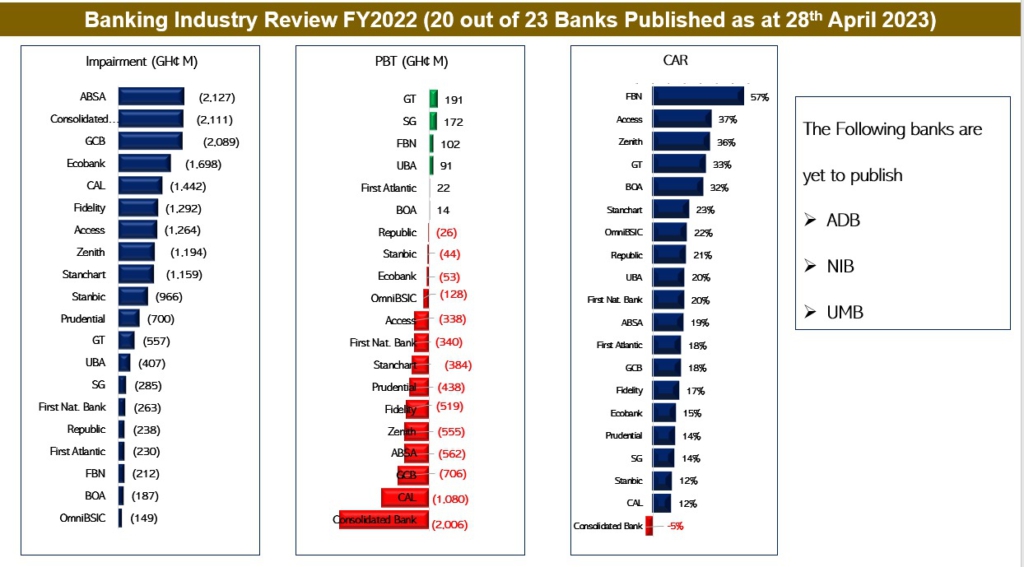The majority of banks that have released their 2022 audited financial statements have recorded losses.
Twenty out of the 23 banks, which is about 86.9%, who have released their statements as of April 28, 2023, registered losses in the financial year of 2022.
This record loss is a result of a difficult economic environment that triggered the Domestic Debt Exchange Programme or debt restructuring, impacting negatively on the operations of the financial institutions.
According to their 2022 Summary Financial Statements, most of the banks’ assets were impaired due to reduced coupon rates and the extension of the maturity period from five to 15 years, among others.
In 2022, the six banks that recorded profit (PBT) included GT Bank (¢191m), Societe Generale (¢172m), FBN Nigeria (¢102m), BOA(¢14m), First Atlantic Bank(¢ 22m) and UBA (¢91m).

For impaired assets, Absa Bank was the biggest casualty, writing off ¢2.12 billion. It was followed by Consolidated Bank and GCB Bank, which also wrote off ¢2.11 and ¢2.08 billion, respectively.
FBN Nigeria (¢212 million), Bank of Africa (¢187 million) and Omni BSIC (¢149 million), however, were the least affected.
For the capital adequacy ratio, which is a key financial soundness indicator, Consolidated Bank (-5%) fell far below the industry threshold of 10%.
Consolidated Bank Ghana also recorded about ¢2 billion loss in 2022.
Access Bank, GT Bank and FBN Nigeria, however, recorded the largest capital adequacy ratio of 57%, 37% and 36%, respectively.
Indeed, the local banks were the biggest losers.
Meanwhile, NIB and UMB are the banks that are yet to release their 2022 Financial Statements.
However, the financial intermediaries introduced by the government recovered swiftly in the first quarter of 2023.
Financial intermediaries like the regulatory forbearance on liquidity and solvency, which helps the financial sector regulators to temporarily reduce regulatory capital and liquidity requirements for regulated firms and schemes that voluntarily participate in the debt operation.
Regulators are to suspend or delay any new rules that will have an adverse impact on liquidity or solvency. Each regulator will communicate more specific reliefs to its regulated firms/schemes in due course.
Meanwhile, the government has established the Ghana Financial Stability Fund (GFSF) with a target size of GH¢ 15 billion to be provided by the government of Ghana and its development partners.
The fund is to provide liquidity to financial institutions that participate fully in the debt exchange. All financial institutions (banks, SDIs, pension schemes, collective investment schemes, fund managers, broker/dealers, and insurance firms) that fully participate in the debt exchange can access the GFSF for augmented liquidity support, with effect from the date of completion of the debt exchange.
The accounting treatment is to help regulators who are already in discussions with external auditors of financial institutions to provide guidance to ensure a standardized approach to the accounting treatment applied to the debt exchange.
Reports had indicated earlier that banks in Ghana lost about GH¢15 billion in 2022 due to the Domestic Debt Exchange Programme.
















